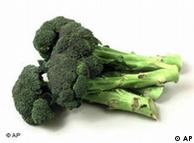Plant Biosciences,
a British company, was awarded a patent in 2002 for a method of
selectively increasing the level of glucosinolates - a potentially
anti-carcinogenic substance found naturally in broccoli.
The company has said
its breeding techniques were advanced enough to be different form
conventional selective breeding and thus deserved patent protection. The
Israeli Ministry of Agriculture has developed similar means of creating
a tomato with reduced water content. Both cases are being heard this
week by the European Patent Office's Enlarged Board of Appeal in Munich.
Using a mix of classic
techniques and technology the Plant Biosciences said its products
contain traits "not available in the 'population' of modern cultivated
broccoli."
"Even with modern
techniques, implementing such 'wide crossing' strategies […] remains a
significant technical challenge," the company said in an e-mail to
Deutsche Welle.
Biological processes can't receive patents
 Bildunterschrift: Großansicht des Bildes mit der Bildunterschrift: Broccoli could determine the way Europe's biological patents are awarded
Bildunterschrift: Großansicht des Bildes mit der Bildunterschrift: Broccoli could determine the way Europe's biological patents are awarded
Current
patent law in the European Union states that no purely biological
process is patentable. Opponents of the awarded patents have said that
the processes Plant Biosciences and the Israeli ministry use fall within
the realm of biological processes.
Plant breeders have
used selective breeding for centuries to create more robust plants and
crops and to increase yield sizes. The new techniques make that process
faster, and possibly more reliable, according to opponents, like the
Germany-based company Limagrain, which is among the parties contesting
the patent.
Species protections
laws in Germany allow plant breeders and farmers to use any sort of
produce in their own breeding practices. This would no longer be legal
if the products created were included under patent protections,
according to Limagrain.
New types of plants,
such as crops that resist droughts or are less susceptible to flood
damage, are regarded to be one way developing nations could increase
agriculture yields. Their breeding processes would be severely limited
if companies are allowed to patent their produce in addition to the
technique used to create it.
"If patents on
broccoli and tomatoes are not denied, then the flood gates will open,"
said Christoph Then, a patents advisor for Greenpeace, in a statement.
"A small number of agriculture and food companies could in future
control all food production, meaning increased dependence and prices for
farmers and consumers."
The EPO's appeal board is not expected to rule on the cases until October.
Author: Sean Sinico/Sonia Phalnikar (dpa/AFP)
Editor: Cyrus Farivar









